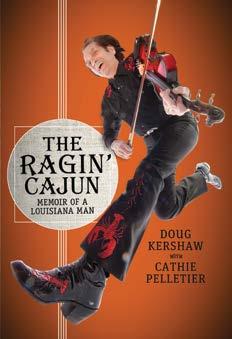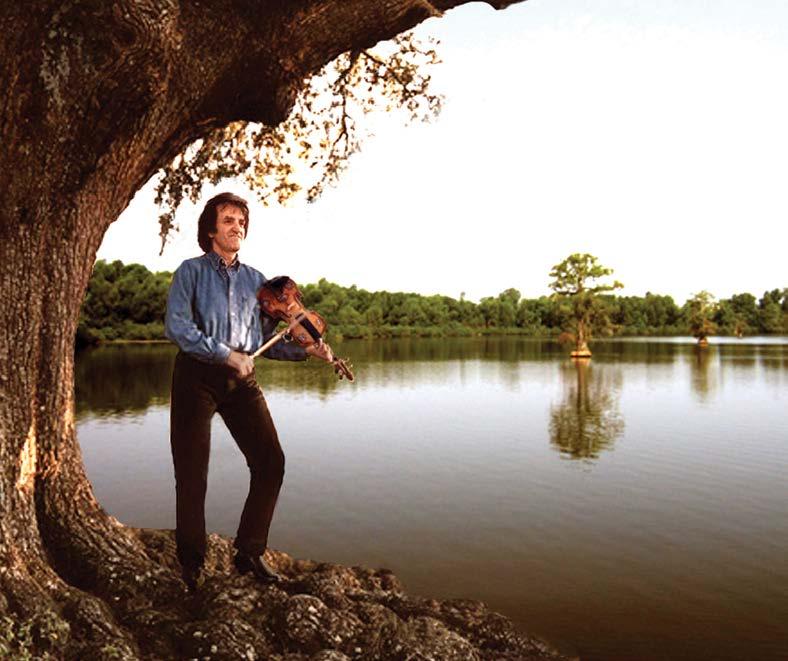
5 minute read
REVIEWS The Ragin’ Cajun Doug Kershaw publishes a
Doug Kershaw with Cathie Pelletier The Ragin’ Cajun – Memoir of a Louisiana Man Mercer University Press

Doug Kershaw, a 62-year member of Local 257, reflects on his life in a compelling autobiography that paints a vivid picture of the unique culture of rural Louisiana and the Cajun music that he came to personify. Co-written with Cathie Pelletier and told in Kershaw’s own words, The Ragin’ Cajun takes the reader on a long and winding path from rivers, swamps, and small towns onto the biggest stages in the world. Through many ups and downs, Kershaw, the living personification of his autobiographical signature song, “Louisiana Man,” managed to survive numerous brushes with disaster and found redemption at last. This book is not for the squeamish or easily offended, but the frankness of his narrative is refreshing and reveals the many layers behind his high energy persona.
The hardships and challenges that Kershaw endured before the age of 10 would be insurmountable for most people, but somehow he made it through it all and brought the fiddle and accordion music of southwest Louisiana to the world. It’s not easy to imagine a family living on a homemade houseboat on the river with their survival depending on their trapping and fishing skills, not to mention never having shoes until your eighth birthday! Just as incredible is that speaking his native French language was deemed illegal in the state of Louisiana at that time, and he had to learn English as a second language out of necessity.
Kershaw’s uncle noticed his fascination with the fiddle, and built the toddler a homemade one from a cigar box, gator bone, wood, and wire, and he quickly graduated to the real thing by the age of five. His tempestuous father, Daddy Jack, committed suicide when Doug was seven, and his mother did whatever she had to do to take care of her children. Doug shined shoes and played fiddle for tips, and brought the money home to his mother. He and his brothers played music together in various groups, and worked their way into the music business, eventually as the duo Rusty & Doug, and performing on the Grand Ole Opry and beyond. Kershaw’s behind the scenes Nashville stories of the ‘50s and ‘60s are fascinating and give a unique glimpse into the seamy side of Music City. Publishers, agents, and musical partners all found ways to get a piece of Kershaw’s revenue stream that they did not deserve, and he learned many lessons about what NOT to do to succeed in the business. Despite it all, he was a consummate entertainer who carved out an individual persona and repertoire like no other. This led to every imaginable kind of gig, including appearances on The Johnny Cash Show, having a song beamed back from Apollo 12, playing the Super Bowl halftime show, and getting married onstage at the Astrodome!
The saga of Kershaw’s personal life is even more convoluted than his musical journey, and he is unflinchingly honest about his own mistakes, as well as the actions of those who took advantage of him. His longtime alcohol and drug abuse wasted a small fortune, nearly killed him, and almost cost him his marriage to the love of his life, Pam. Her nearly infinite patience with his behavior and final ultimatum saved his life and gave him the chance to redeem himself. He finally became the father and man he had been unable to be before, which has brought him peace and resolution. This is a well written memoir of a complex man whose life and music has gone full circle from the swamps of Louisiana to the mountains of Colorado, and the moon and back. – Dave Pomeroy

Steve Purcell Ample’tudes Grandaddie Records
Steve Purcell named this record appropriately. Listening to the 10 cuts he includes in this collection reflects a dizzying mastery of distinctly different musical attitudes, or styles. He connects them all with fun audio droplets of revving engines, church bells tolling and footsteps between songs that somehow work to set the listener up for what they’re about to experience.
TNM The opener ”Hammer Down” took me straight to a Hendrix vibe replete with wah-wah and whammy bar-driven solos that smoothly morphed into speed-metal, Steve Vai-ish dexterity. Then Purcell relaxes in a Spaghetti Western cut, “Rattlesnake Road,” where guitar chords fall safely off the table among “Hoo, Hah” backing vocals. I envisioned Clint Eastwood looking smokily across the spare landscape while gnawing on a stogie.
Purcell brings on board several Local 257 members such as Randy Kohrs on dobro and traveling member Tim Crouch, who adds fiddle and mandolin on “Angel in Hell” — a Waylon type groove that is a dark portrait of the writer’s encroaching death and the company he’ll keep in his destination. Track four, “Retro Radio,” is actually a static laden radio being shuttled through stations as if on a road trip trying to find just the right mood. No problem! Track five, “Mouse in the House,” turns out to be that perfect cut. An instrumental with the exact emotional balance for putting mindless miles behind you. More Local 257 members, Eugene Moles and Dave Gant, appear here as Moles lends some guitar strutting and Gant adds B3 and Wurli. Gant also cranks up the B on “Messin’ With the Kid,” a screamer with an edgy live aroma. Yeah, you can smell the intensity!
Purcell himself is at the center of all this slinging and the colors he employs includes track seven’s picking style reminiscent of Tommy Emmanuel on “Bits and Pieces.” Feels like a jazz club date with lots of air in the room. Made me want to order a drink. Purcell is then asked to play “the riff” and he sure does, showing that he don’t need no combo to hide behind. The pocket is all about them fingers of his.
At the end of this extravaganza Steve signs off with “Don’t Say Goodbye,” which is sparse, intimate and acoustic driven and puts a warm, simple cap on the bottle we opened about 40 minutes ago. A sweet, human touch. I had a ball sitting with Ample’tudes and am sure you will, too. — Hank Moka










